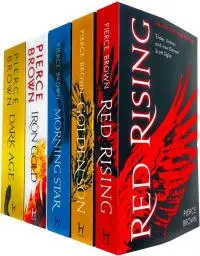Photo via author website
Eight years ago, Pierce Brown drove a clawdrill through the literary world with his stunning science fiction book, Red Rising. We met Darrow, a young Red miner, toiling in the tunnels of Mars with the promise of a bright future thanks to their sacrifice. But that was all a lie.
Five books, one rebellion, and more deaths that anyone cares to tally later, the series has attracted legions of loyal Howlers who are rabid for the next installment. And Light Bringer is finally here. It’s been nearly four years since Dark Age devastated readers, and while we’re finally able to reunite with our favorite characters, we’re desperately praying to the Allmother that Brown doesn’t kill them.
As one of those rabid fans, I was ecstatic to sit down and talk with Brown about his writing process, how his habits have changed, and what his fans to mean to him.
Can you tell us your writer origin story?
I had no idea you could be a writer. I was in High School and had just finished A Feast for Crows. And there was a big gap between that book and A Dance of Dragons. I had already blazed through pretty much all the epic fantasy that was out. One night I just started writing on a yellow legal pad. It was this scene of mercenaries trying to capture a dragon to harvest its eggs. In one night, I wrote around twenty-five pages. And I asked myself if I should keep going, if I should put this scene into an actual world.
At the time, I had just graduated and I’d moved up to Seattle. My parents were cool enough to let me live rent-free as long as I was working. So, I wrote my first book during that time. It was a monstrous eight-hundred-page tome. I was writing something like fifteen pages a day. I was a maniac.
And that’s my origin. Impatience while waiting for George to write a book.
What does your typical writing day look like?
I work out every morning, and then I try to write in a four-hour chunk. Some days I’ll write longer, but before I get into emails or do anything else, I focus on those four hours.
If I can sit down and concentrate, I’ll get the work done that I need to get done, and not feel insecure about it the whole day. Life can get in the way of too rigid a routine, so the biggest thing is trying to find my center when I’m in a rut. I do that by trying to limit my phone time, I’ll put it in a different room. I won’t listen to music because I find that can dictate the tone of the writing. And I turn everything else off. I’ll put a sticky note that says, write 500 words, or write 1000 words.
It’s about breaking things down into something achievable. I always forget you can’t finish a book in a day. When I’m in those periods of insecurity about what I’m writing, I’ll want to start editing and then that creates more problems. I find making an achievable goal that I can get done in that session helps me actually get the writing done.
I think we feel quite a lot of pressure and then shame when we don’t live up to this arbitrary measuring that is put out there. So many articles are about self-maximization right now. And is it any wonder? We’re a society that loves success and achievement. But it’s just another way for us to feel shame.
Most people, when they tell you what their habits are, are going to present their ideal. I’d say, half the time I don’t do what my routine is, and often that doesn’t work out for me very well. That’s why I try to have a routine that’s achievable.
What does your writing process look like?
I usually write three drafts. In the first draft, I just write through it. And it’s the hardest thing for me to do. The second and third drafts are easier for me. I don’t think you can do maintenance on the engine or change the wheels until you have your vehicle. When I try to do spot treatment before it’s finished, that’s when I get really bogged down. I can’t try to fix things along the way when I don’t know what it’s going to be yet.
Once I know the dimensions, then I can see the details—where the wheels fit, what kind of engine it needs. Before that, I’m just guessing. So, I write my first draft to complete it.
My editors are always a bit scared of that first draft. They don’t want to show it to anyone. Then by the second draft, they see it’s getting good. And by the third draft they’re relieved I made it happen. Every time I submit a first draft, everyone is terrified. But I have good editors who give me good advice. And my best skill set is figuring out the second and third draft.
Has your process or daily habits changed over time?
 I found I was having too many rituals. So, I’ve tried to become more efficient. I’d also say, I hit the nadir of my competence-confidence curve while writing Light Bringer. I regained my confidence near the end, but there was a long period of time where I was really doubting the material. I had to start over, which gave me an existential anxiety attack that I had to get through. I probably ended up writing around a million and a half words for this book. I had a lot of false starts.
I found I was having too many rituals. So, I’ve tried to become more efficient. I’d also say, I hit the nadir of my competence-confidence curve while writing Light Bringer. I regained my confidence near the end, but there was a long period of time where I was really doubting the material. I had to start over, which gave me an existential anxiety attack that I had to get through. I probably ended up writing around a million and a half words for this book. I had a lot of false starts.
And then, anxiety and a looming deadline made me a twelve-hour a day writer, which is totally unnecessary. What I try to do now, in terms of maintaining my real life is the Stephen King method. Like I said, I aim for four good hours of writing. Otherwise, it can take over my entire day, and then I’m building anxiety over the other things in my life I’m not dealing with.
My biggest things are I take care of my mind, take care of my heart, and then write. So, I work out, I walk my dog, I might send a message to someone I care about, and then I work. In that four-hour time, I’d say 2,000 words is a great metric for me. I know people who do 4,000-5,000 a day, but everyone’s different.
Your fans have become such a huge and vocal group. Does that ever stifle your writing or get in the way?
Sure, they can stifle. The fans are the lifeblood of the series. They’re the people who allow me to live a comfortable life. And the enthusiasm is something I take to heart. So, yeah, the fans' opinions matter to me. At the same time, I have to divorce myself from the static around the series because I wrote Red Rising, and even Golden Son, without anyone’s input before there were fans. I have to trust myself. That’s easier said than done, but it’s always easier to criticize something that’s already there.
It's way easier to edit something that exists than coming up with something from nothing. Perhaps, their criticisms are right sometimes. But I only have so much time in the day, I can only make something as good as I can. I do the best that I can, but no work is going to be perfect because no writer is perfect. I’m at peace with it, I think you have to be.
What advice would you give to a new writer?
Write the book you wish existed, not the book you think others want.
You’re working on the final book in the series, Red God. Anything you can tell us?
I’m in the middle of it now, so I can tell you it won’t be as long a wait as Light Bringer. I can guarantee that. I’d love to have it out next year, but it will probably be the end of the year, unless I really hit a stride. I have a lot more cut out for me.
Get Light Bringer at Bookshop or Amazon

About the author
Jena Brown grew up playing make-believe in the Nevada desert, where her love for skeletons and harsh landscapes solidified. In addition to freelance writing, Jena blogs at www.jenabrownwrites.com. When she isn’t imagining deadly worlds, she and her husband keep busy being bossed around the Las Vegas desert by their two chihuahuas.








